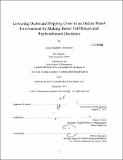Lowering outbound shipping costs in an online retail environment by making better fulfillment and replenishment decisions
Author(s)
Acimovic, Jason Andrew
DownloadFull printable version (20.77Mb)
Other Contributors
Massachusetts Institute of Technology. Operations Research Center.
Advisor
Stephen Graves.
Terms of use
Metadata
Show full item recordAbstract
As online retailing - or e-tailing - continues to grow as more and more customers buy physical goods on the internet, finding ways to reduce the cost and environmental impact of outbound shipping in this sector will become increasingly important. We investigate the impact of making poor fulfillment and replenishment decisions using data obtained from a large American online retailer. Then, we propose implementable - i.e., computationally tractable and relatively intuitive - solutions for both the fulfillment and replenishment problems, both tested either on actual data from our industrial partner or on small but realistic models. We first focus on the fulfillment problem, namely, deciding from which warehouse(s) to fulfill a customer's order when several options exist. We propose a heuristic that utilizes the dual values of a transportation linear program to estimate the opportunity cost of depleting inventory from a warehouse. This linear program values inventory at a warehouse due to both its geography and the size of its catalogue. After showing that this linear program is asymptotically optimal - using concepts developed in airline network revenue management - we then test the heuristic on industry data, showing a 1% reduction in outbound shipping costs as compared to a myopic fulfillment policy. The last part of the thesis focuses on replenishment. Every period, for each item, the network places an order to restock all the warehouses. Complicating this decision are two factors. First, the orders will not arrive immediately, but rather require a lead time to be delivered. During this time a random number of customers will place orders with the network. Second, any customer's order may be filled from any warehouse, which becomes important when warehouses stock out of an item. Therefore, it is not trivial to calculate the optimal inventory to order to each warehouse. We show that using a standard replenishment policy - popular in practice - can lead to dynamics that result in increased outbound shipping costs. We propose a replenishment policy heuristic that is intuitive and performs well on examples. This heuristic has two variants: a simpler one that assumes deterministic demand, and a more complicated one that accounts for stochasticity.
Description
Thesis (Ph. D.)--Massachusetts Institute of Technology, Sloan School of Management, Operations Research Center, 2012. Cataloged from PDF version of thesis. Includes bibliographical references (p. 181-185).
Date issued
2012Department
Massachusetts Institute of Technology. Operations Research Center; Sloan School of ManagementPublisher
Massachusetts Institute of Technology
Keywords
Operations Research Center.